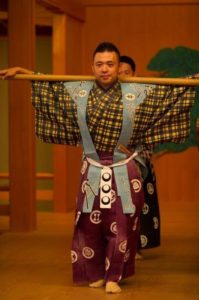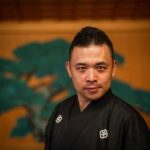“Kyogen is like a dietary supplement for our daily life” Okura-school Kyogen performer Tomitaro Zenchiku ~ Descendant of a Living National Treasure, and evangelist of traditional comedy established during the Muromachi period (1336-1573) ~

Kyogen, the oldest existing form of Japanese comedy, describes humor and fun lying in our daily life using unique lines and acting moves. A young Kyogen player who took over the Okura-school, a group leading this form of comedy from ancient times, Mr. Tomitaro Zenchiku is passionate about sharing the essence of this art among us living in today’s world.
(hayakawa)
Though Kyogen is a classical comedy art being passed down for 700 years, it is not known well among people compared to KABUKI.
Can you share with us starting from the basics of Kyogen?
(zenchiku)
When you hear the word KYOGEN, it comes with a solemn image, difficult to understand. However it’s a form of comedy passed down from the Muromachi-period. It is just like today’s “M-1” (a famous Japanese Manzai comedy competition). So I hope everyone will enjoy Kyogen at ease.
There is “NOH-GAKU” entertainment, which is a combination of “NOH” and “KYOGEN.”
Actors of “NOH” are masked; usually tells stories of people, especially looking back at historical warlords. Not gloomy, but often subject to serious themes.
On the other hand, in Kyogen’s we touch upon our daily life in dialogue using “~gozaru” at the end of a talk, a popular phrase used through Muromachi to Edo period. Characters are chosen among Samurais, farmers, merchants, craftsman, priests and monks, thieves, swindlers and bandits. Sometimes even gods of fortune prospering your present life, demons and ghosts, spirits of animals and plants are in the play, but never will character anyone in a noble class.
There are some other unique protocols, such as to put the accent on the second syllable of a word. There are also many other rules on acting and directing
“I think Kyogen is like a dietary supplement. Stories of the ancient described with laughter have something in common with today’s life. I hope people today will be able to spend fruitful lives through watching it.
(hayakawa)
Among Kyogen schools, what are the typical aspects of your Okura-school?
(zenchiku)
Big, easy and gentle motions.
(hayakawa)
Please tell us about your career.
(zenchiku)
I started taking lessons when I was 3 years old. My debut was 5. I don’t remember my first lesson, but I remember I caught a fever on the next day of my debut playing as a baby monkey. Maybe I overused my brain! I became a professional Kyogen actor after I graduated college. Ideas vary according to each Kyogen acting families; sometimes the child will be absent from school for a stage. But both my grandfather Keigoro and my father Juro had thoughts that schoolwork must be dealt seriously, so I went to school like ordinary kids all the way up to college. In Jr. High and High School, I was captain of the basketball team; and my major in college was psychology, which had nothing to do with Kyogen. During my days in elementary school, unlike my friends I had to go home first to do my Kyogen lesson before I join them for soccer or baseball. When I look back, I think I kept a sense of distance dealing with Kyogen instead of being fully occupied with, which was indeed good for me.
(hayakawa)
When I meet a so-called “Bunkajin” (a Japanese word to describe cultural intellects) I honestly find them as different kind of people with sense of humanity different from the rest of us, but not in your case. Perhaps it is important to have a “sense of balance”. What is your opinion?
(zenchiku)
Our goal is to have Kyogen to be understood among today’s audience without description or comment. Being already 650 years old, I feel some deal of interpretation is required.
(hayakawa)
You come from the honorable Zenchiku family. Does it mean anything to be part of such a family?
(zenchiku)
My great grandfather Mayugoro became the first Living National Treasure from Kyogen, and I do feel responsible in this matter of my roots. Mayugoro had 5 sons; the youngest was my grandfather, Keigoro. Second eldest son of Mayugoro was my predecessor and head master of our School. As many of my predecessors have kept the Kyogen tradition, I should bring it to the future with new changes, which I regard as my mission.
(hayakawa)
What are the requirements to inherit the tradition?
(zenchiku)
Obviously, practice. Amount of time is not set for practices, but both my brother and I schedule time as we both have other work to do. We even often chat over lunch on Kyogen. I feel the importance to have such time, considering the limit of time we have.
 (hayakawa)
(hayakawa)
In our website LEADERS ONLINE, we set our purpose to spread important Japanese culture and genuine aspects to the young, as well as towards abroad, interviewing runners of old businesses and well-known individuals.
Although there are many kinds of traditional cultures in Japan, many people do not know about them. Is there a way for them to enjoy Kyogen?
(zenchiku)
In the first place, many of us Japanese do not know about Japanese culture. Though we say to ourselves we must do something about it, or to feel we must know, we eventually end our lives without studying.
Since the 2020 Olympic Games will be held in Japan, there shall be many people visiting our country. This may trigger people to take a glance of our historical and cultural heritage, reviewing who we are as Japanese. I wish Kyogen also to be looked in such occasion. After all, Kyogen is comedy, which is supposed to be fun.
(hayakawa)
Zenchiku san’s “KYOGEN DOJO,” based on your original drama text, explains the knowledge on Kyogen so that even a beginner will understand. We clearly sense you are trying to penetrate through your YouTube uploads of KYOGEN DOJO. If you spread this KYOGEN DOJO nationwide in a more frequent manner, it may bring higher penetration rates. On the contrary, it will be quite difficult for someone who have little knowledge and pre-guidance to understand.
(zenchiku)
In KYOGEN-DOJO, I introduce how to enjoy Kyogen as easy as possible using videos which includes some of my lectures, so everyone including elementary school students can understand what KYOGEN is. They are available at my official website, so please watch them if interested.
We also wish you visit us at “Kyogen night at Shibuya” where we “deliver endless laughter, even for an elementary school kid to understand”. We try to make you smile and become happy with Kyogen. It is held at evenings in places such as the Cerulean Tower in Shibuya. You may buy tickets from my official website:
(https://passmarket.yahoo.co.jp/event/show/detail/01m34zys4xkh.html)
(hayakawa)
“Kyogen” does not rhyme with the “Shibuya” image. Most people do not even know there is a Noh theater at Shibuya in the first place. Why don’t you focus your activities on young people?
(zenchiku)
Yes, everyone knows where the Kabuki-za is. But hardly anyone would know there is a stage for Kyogen in Shibuya. However Kabuki formed itself gaining aspects from Noh-Raku. Noh-Raku was established in the Muromachi-period, and Kabuki was established much later in the Edo period. We desire to steadily maintain our heritage, and to raise awareness of Kyogen.
(hayakawa)
At this very end of our interview, can you give us some messages to our followers of this article including business managers and those abroad?
(zenchiku)
Please come visit to watch Kyogen. Feel the ambiance of the Noh-Stage, feel how the real voice echoes. I wish many people would come to see our stage.
 【profile】
【profile】
Tomitaro Zenchiku (Kyogen actor) born August 10th, 1979
Graduate of Gakushuin University, Department of Literature, Faculty of Psychology.
Grand masters: Late Keigoro Zenchiku (Grandfather)、Juro Zenchiku (Father)
Started lesson from 3 years old; debut at 5 as a baby-monkey in “Utsubozaru.”
Now, trying to spread Kyogen to the world in activities such as “Kyogen night at Shibuya”
Holds classes at Toho Gakuen College of Drama and Music, and Showa College of Music
【Okura School】
Founded in the later years of the Muromachi period by Okura Mayuemon family whom played Kyogen at the Komparu-za. Headmaster family is titled under this name. Four members from the family including the late Zenchiku Mayugoro were awarded as Living National Treasure in Japan.










